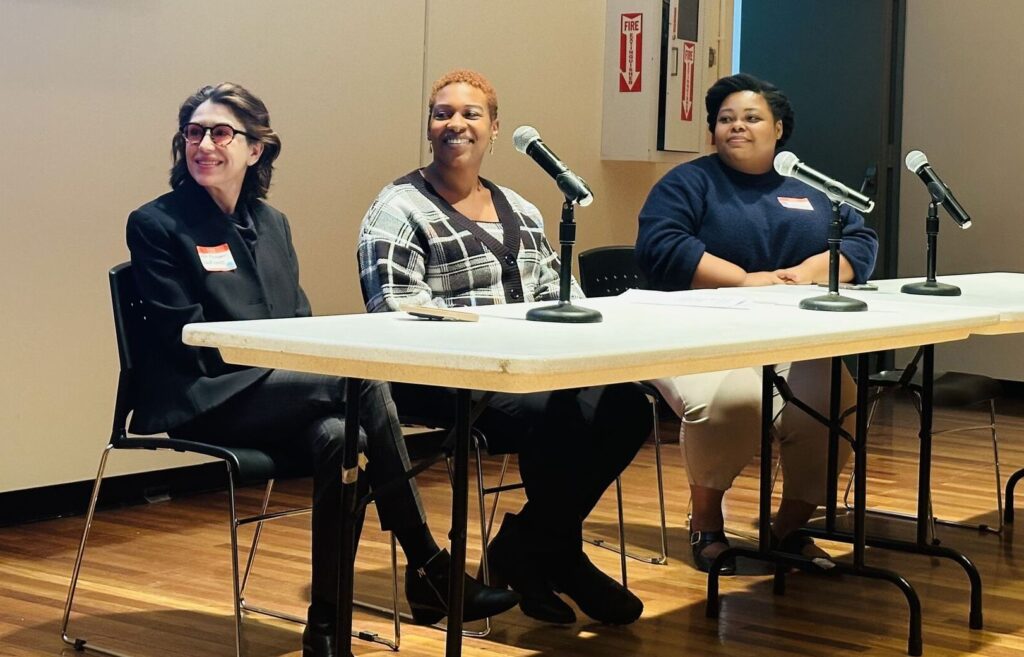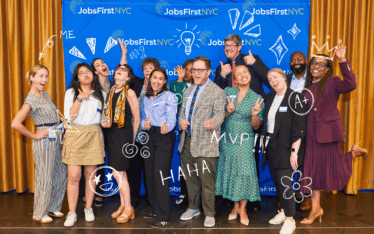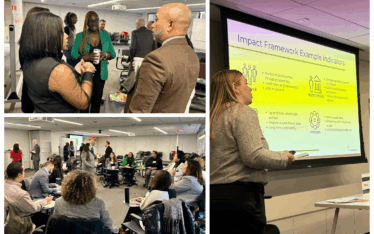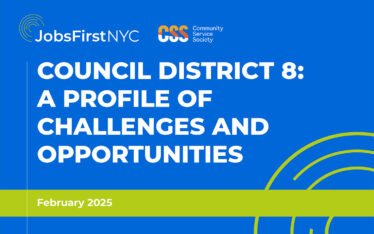Our blog series, 5 Questions in a New York Minute, highlights the work of JobsFirstNYC’s partners in New York City’s workforce. Through concise and insightful interviews, we aim to spotlight the unique experiences, strategies, and new approaches of a diverse group of individuals as they navigate and adapt to a rapidly evolving work landscape in one of the world’s most vibrant cities. Join us for inspiring stories that shape the Big Apple!
5 Questions in a New York Minute with Senior Director of Community Engagement at Solar One, Shakira Hart
Can you provide an overview of your organization’s mission and how it specifically supports young people who are out of school and out of work?
Solar One is dedicated to empowering underserved communities, particularly young adults who are out of school and out of work, by providing access to sustainable career pathways within the green economy. We provide comprehensive training programs that incorporate renewable energy, energy efficiency, and sustainability through our Bronx and Brooklyn Clean Energy Hubs and partnerships like JobsFirstNYC’s Green Economy Network (GEN), of which I am the Co-Chair of the Steering Committee. In these roles, I develop workforce initiatives and facilitate connections between young adults and green industry employers, helping them gain relevant, marketable skills, and build a foundation for long-term success in green careers.
What are some of the biggest challenges that young adults who are out of school and out of work—and most at risk of becoming out of school, out of work—face, and how does your organization address these challenges?
Many young adults face several barriers including limited access to education, support services and other resources, and job readiness training. Solar One tackles this challenge by focusing on practical, community-centered training to ensure learning opportunities are accessible to all. Partnership with service organizations offering the resources participants need, is instrumental in helping them to overcome their unique challenges and empowering them to succeed.
How do you measure the impact and success of your programs, and which of your approaches to addressing the needs of job seekers has been most effective?
To gauge success, we look at several factors—job placement rates, retention, and advancement in green sectors, as well as feedback from participants and employers. Seeing participants thrive in full-time roles in the green economy is the ultimate marker. Our hands-on training, especially in solar and energy efficiency, has been particularly effective – in attracting both the interest of job seekers and employers. With GEN, I help track these outcomes and regularly assess how we can fine-tune our approach to better support young adults, ensuring they gain skills that genuinely move the needle in on-the-job success.
Can you share a success story or notable achievement of a young person who benefited from your organization’s programs?
One young man from the Bronx stands out. He joined our solar training program through Solar One and the GEN after facing significant challenges in finding employment. As a result of completing our hands-on solar installation training, he gained technical skills and the confidence to pursue a career in the green sector. He is now employed by a major solar company and on the path to a leadership role. His journey is a powerful example of how our programs equip participants with the skills and self-belief needed to thrive. Now, he’s paying it forward by supporting his community, participating in Solar One career fairs, and helping connect others to job opportunities through his employer.
What book, person, or event has inspired you the most?
The recent ILR Climate Jobs course has been a powerful inspiration for me. This program highlighted the intersection of labor, sustainability, and policy in a way that underscored the urgent need for innovative workforce solutions in response to climate change. Engaging with experts and peers passionate about sustainable labor practices and economic resilience helped me see the critical role workforce development plays in driving environmental impact at scale.
The course reinforced my commitment to advancing climate-conscious career pathways that equip workers for a sustainable future. Seeing firsthand how strategic, equity-driven workforce initiatives can support climate goals solidified my resolve to pursue meaningful contributions in this evolving field.

Shakira Hart (center), Senior Director of Community Engagement at Solar One, Keri Faulhaber, Senior Vice President of JobsFirstNYC, and Kendra Jones, Director of Bronx Programs at The HOPE Program, served as panelists at the Energy and Carbon Management Training Student Project Showcase.
Solar One is a 501(c)(3) not-for-profit organization whose mission is to design and deliver innovative education, training, and technical assistance that fosters sustainability and resiliency in diverse urban environments.
Solar One is a member of JobsFirstNYC’s Green Economy Network – a partnership between workforce development agencies, community-based organizations, and employers that strengthens collaboration among nonprofits, colleges, and employers to improve skills training, leverage knowledge and resources, and increase access to quality jobs in the green economy.





